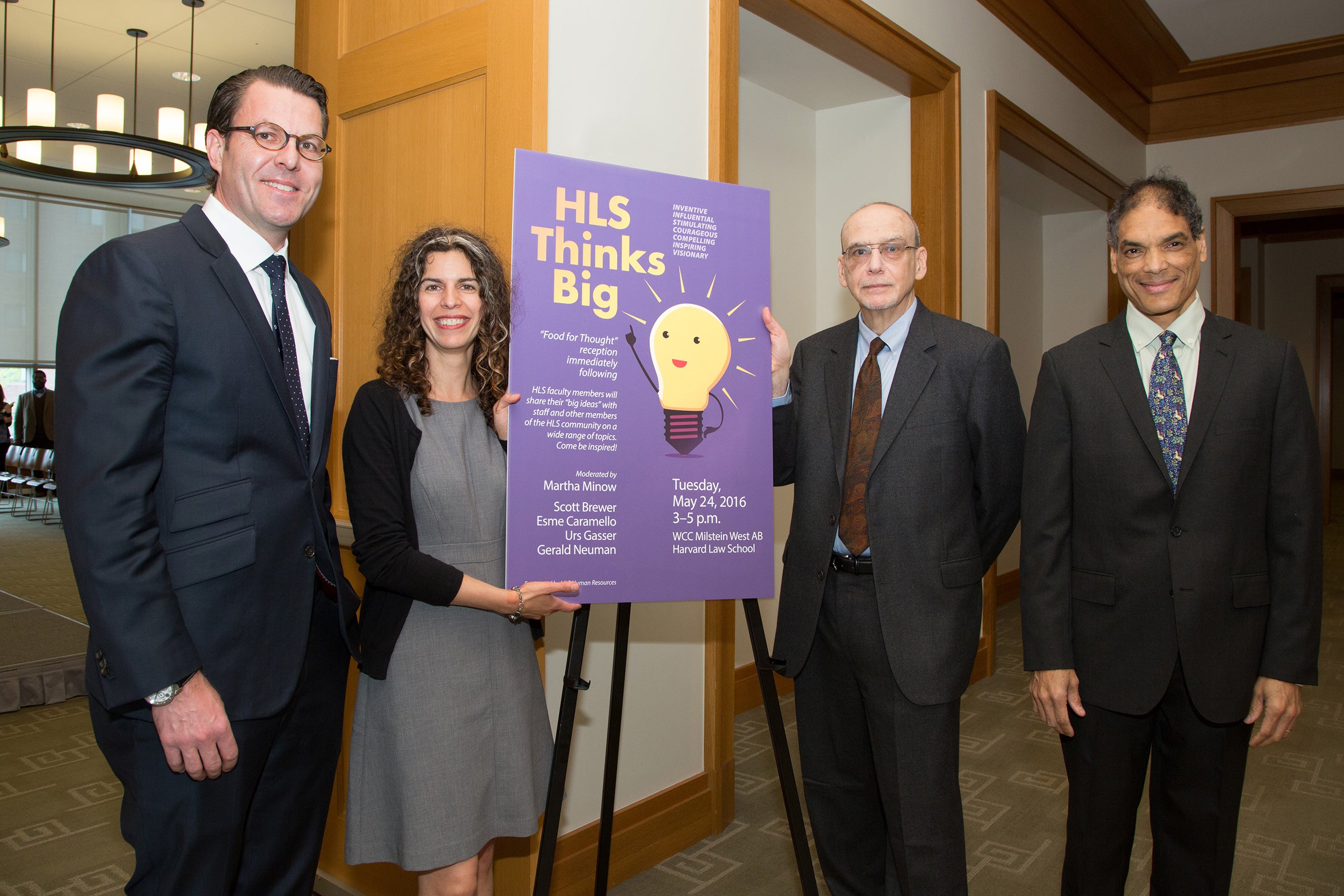In late May, four Harvard Law faculty — Scott Brewer, Gerald Neuman ’80, Esme Caramello ’99, and Urs Gasser LL.M. ’03 — shared snapshots of their latest research with the Harvard Law School community as part of the HLS Thinks Big speaker series. HLS Dean Martha Minow introduced them and led a lively question-and-answer session afterwards.
Professor Scott Brewer, a lawyer and a philosopher, took his audience through “a meta argument” on the virtue of argument and arguers in the legal academy. Brewer said has been teaching the “logocratic method” for many years, “a method for assessing the strengths and weaknesses of arguments in any domain, including law.” After a fast-paced and complex set-up beginning with Aristotle, Brewer’s own argument about the virtue of argument focused on the academy, and in particular on Harvard Law School and the recent student activism over safe space and free expression. The academy should foster the skill of reason and argument, he said. But at HLS, some students had been allowed to claim a public space and control speech there by preventing other students from enjoying a certain mode of expression—putting up posters—while enjoying that mode of expression themselves. [See a related piece by Brewer in the Harvard Law Record.] “There is a vast and vital difference between suppressing speech and enforcing norms of toleration,” he said. “Power can be used virtually or viciously,” he added. Using administrative power to enforce a norm of toleration against speech suppression is a virtuous use, he concluded, urging that HLS create and maintain tolerance “for cooperation and opposition, for collaborative and competitive deliberation, for assertion and denial.”
Professor Gerald Neuman, co-director of the Human Rights Program at HLS, spoke about killings by U.S border patrol officers across the US-Mexico border. Specifically, he talked about the killing of a 16-year-old Mexican boy who was shot through the fence in Nogales, Sonora, by a border patrol agent who fired from the Arizona side of the border.
He said the case, Rodriquez v. Swartz, raises issues of extrajudicial application of constitutional rights, i.e., when do U.S. constitutional rights apply to non-US citizens? Neuman, one of the foremost academic authorities on the question, wrote an amicus brief in the case, which was brought by the boy’s mother, and is now before the U.S. Court of Appeals for the 9th Circuit. The brief argues in essence that residents of Nogales, Mexico, should be able to invoke the protections and remedies available under the U.S. Constitution against unlawful actions by the U.S. Border Patrol. “Law enforcement that affects universal rights,” he said, “should be governed and limited by the Constitution.”
Clinical Professor Esme Caramello, deputy director of the Harvard Legal Aid Bureau, spoke about how the practice of putting records of tenants involved in eviction proceedings online has had unintended negative effects on tenants. While she generally supports open government and transparency, she said that landlords now use this tool to screen tenants. That makes it very hard for people who have been named in eviction proceedings to get housing.
She has found that the online records, which are now so easily available, are often inaccurate. Many landlords even name children in eviction proceedings, which can give them eviction records before they enter the housing market as renters themselves. Tenants’ advocates have also seen landlords use the threat of ending up in the database as a tool to stop tenants from fighting eviction.
Other states have reformed their processes. New York has stopped putting tenants’ names in databases, and California has a waiting period, so cases that are resolved are not posted online. Other states have a “right to be forgotten.” Caramello said she was surprised to see the strongest opposition for reforming the Massachusetts system coming from members of the press, who want all records online. She argues that reform is necessary, since the current system is preventing people from getting housing and jobs.
Professor of Practice Urs Gasser, executive director of the Berkman Center for Internet & Society at Harvard, spoke about how the knowledge and information landscape has evolved and the effect on the role of universities.
Drawing on studies in the field of internet and society, Gasser focused on a challenge, an opportunity and a vision for academia in this changing landscape. The internet has quickly transformed how we create and use knowledge. Academia, he said, should play an enhanced role in preserving unbiased knowledge and objectivity, bringing new rigor to the process of information storage. And that will require enhanced collaboration among academics and institutions. He held up the Berkman Center as a model for a new kind of DNA in academia, describing the community of individual affiliates working with the center “on the most challenging and pressing problems of our digital age.” He also spoke about larger institutional collaborative ventures such as The Global Network of Internet and Society Research Centers, which brings together more than 70 centers around the world.
